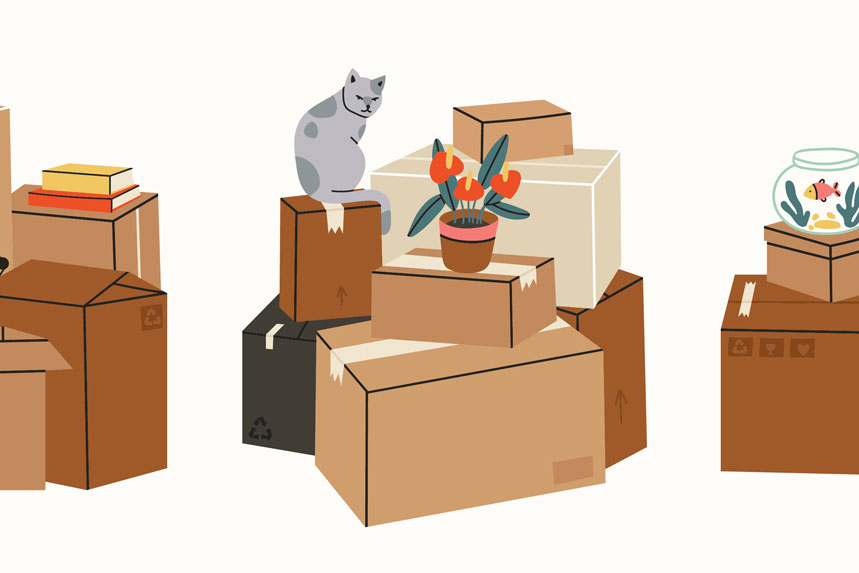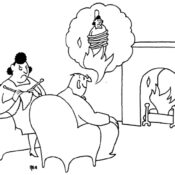My wife recently read an article about Swedish dostadning, literally “death cleaning,” how after Swedes turn 60, they start getting rid of stuff by giving it to people in their 20s. We’ve been married 40 years without once consulting the Swedish, but all of a sudden they’re experts on everything, and woe to us if we don’t ask their advice.
When I say we I mean the marital we, by which I mean my wife. She’s now fascinated with the Swedes, while I’m just along for the ride.
Our death cleaning began with my stuff, not hers, most notably my four bicycles, which she thought were three too many, pointing out I could only ride one at a time. I got my first bicycle 58 years ago when my father cobbled one together from parts he’d found at the town dump. I’ve managed to acquire four bicycles, none of them from a landfill, and now my wife wants me to give most of them to some young whippersnappers who are perfectly capable of getting jobs and buying their own bicycles.
If my death cleaning stopped with bicycles, I’d probably cave in and give them away. But not a day later, she asked me how many pocketknives I had. I’ve been judiciously collecting pocketknives since I was a senior in high school and now have a superb collection she apparently wants to pass out to perfect strangers who will do God knows what with them. Not even the Swedes let just anyone have a pocketknife.
This whole venture strikes me as un-American, an affront to our custom of amassing barnfuls of stuff to leave to our children after we’re dead, and not a moment before. It is then, while sorting through the useful items we’ve entrusted to their care — used Tupperware, mixers with one beater, tablecloths with coffee rings, and slightly used toothbrushes, perfect for cleaning the ink-fouled letters on the manual typewriter we’ll also leave them — that they will come to appreciate our foresight and savvy.
The Swedes aren’t doing their young people any favors by burdening them with their cast-offs, when all they want to do is travel and see the world but now can’t, having to deal with their parents’ junk while their parents are still alive, hovering over them, telling them the value and history of each item, forbidding its disposal. Their description of this custom, intending to sound noble, is in fact deceptive. It is not “death cleaning,” because they are not dead, indeed are nowhere near death, and should therefore keep their stuff instead of pawning it off on those least prepared to deal with it.
I suggest a new custom that recognizes our need to divest of our hoard while giving our kids a hand up. When we die, our children and grandchildren can pick through our stuff, selecting a few cherished or needed items. The rest of it can be heaped on our lawns, our bodies placed on top, and the whole shebang set on fire. That’s something the Vikings used to do that rarely gets mentioned these days: Toss the dead warriors on a ship, push it out to sea, and set it on fire. Problem solved. No more family heirlooms to deal with, no more boxes filling our garages and basements, and no more standing in line for half a day at Antiques Roadshow to discover that our great-grandfather’s chamber pot is only worth $15.
This is probably the best idea I’ve ever had, and if you want to call it “Gulley Death Cleaning,” that’s fine with me.
Philip Gulley is a Quaker pastor and author of 22 books, including the Harmony and Hope series, featuring Sam Gardner.
This article is featured in the July/August 2024 issue of The Saturday Evening Post. Subscribe to the magazine for more art, inspiring stories, fiction, humor, and features from our archives.
Become a Saturday Evening Post member and enjoy unlimited access. Subscribe now




Comments
I’ve always liked Saturday Eve. Post cartoons.
Not a bad idea…..I’d rather see my children or grandchildren enjoy my things when I am well past my prime for their use. I have a Honda Gold Wing motorcycle that someday I’ll pass down to my son while I still have my facilties.
A Swedish decluttering problem solved, American style, by you Philip. Let the children and grandchildren pick out what they want to keep, then the rest of it heaped onto the front lawn with your bodies on top set ablaze! No high funeral costs either. Just make sure one of them has the front lawn garden hose handy. Good to the last ash.